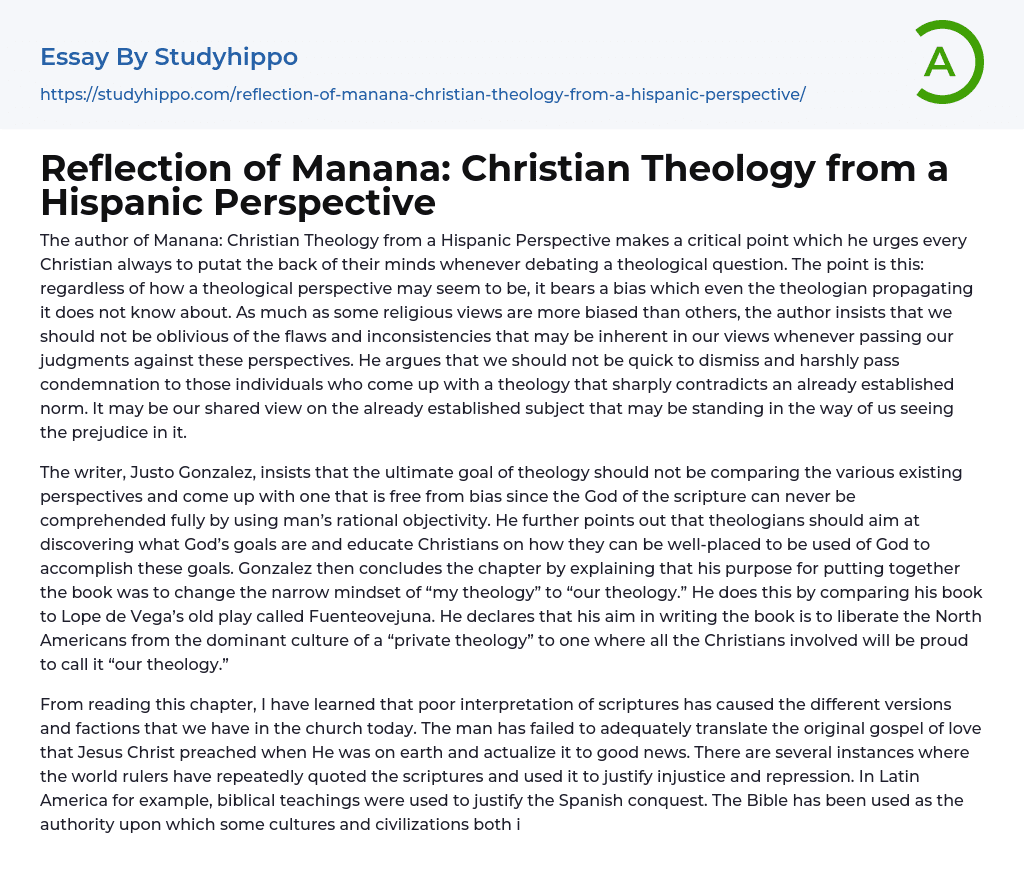

Reflection of Manana: Christian Theology from a Hispanic Perspective Essay Example
The author of Manana: Christian Theology from a Hispanic Perspective makes a critical point which he urges every Christian always to putat the back of their minds whenever debating a theological question. The point is this: regardless of how a theological perspective may seem to be, it bears a bias which even the theologian propagating it does not know about. As much as some religious views are more biased than others, the author insists that we should not be oblivious of the flaws and inconsistencies that may be inherent in our views whenever passing our judgments against these perspectives. He argues that we should not be quick to dismiss and harshly pass condemnation to those individuals who come up with a theology that sharply contradicts an already established norm. It may be our shared view on the already es
...tablished subject that may be standing in the way of us seeing the prejudice in it.
The writer, Justo Gonzalez, insists that the ultimate goal of theology should not be comparing the various existing perspectives and come up with one that is free from bias since the God of the scripture can never be comprehended fully by using man’s rational objectivity. He further points out that theologians should aim at discovering what God’s goals are and educate Christians on how they can be well-placed to be used of God to accomplish these goals. Gonzalez then concludes the chapter by explaining that his purpose for putting together the book was to change the narrow mindset of “my theology” to “our theology.” He does this by comparing his book to Lope de Vega’s old play called Fuenteovejuna. He declares that
his aim in writing the book is to liberate the North Americans from the dominant culture of a “private theology” to one where all the Christians involved will be proud to call it “our theology.”
From reading this chapter, I have learned that poor interpretation of scriptures has caused the different versions and factions that we have in the church today. The man has failed to adequately translate the original gospel of love that Jesus Christ preached when He was on earth and actualize it to good news. There are several instances where the world rulers have repeatedly quoted the scriptures and used it to justify injustice and repression. In Latin America for example, biblical teachings were used to justify the Spanish conquest. The Bible has been used as the authority upon which some cultures and civilizations both in North and South America were destroyed. Paul’s writings have been used to support the idea that it is okay for one to have and keep slaves. Several women who grew and were raised in the Christian circles have come to an absurd conclusion that the Bible is a sexist book and have even gone ahead to disassociate themselves from it. Additionally, there are some Native Americans who prefer the religion their ancestors preached to the modern Christianity since they have felt to find an identity, acceptance, and love in this new Christianity. All these secularizations have come as a result of man have been born from man’s poor interpretation of the Bible, mostly because of wrong teaching or reading out of context.
I have observed that the experience that one undergoes when they are a member of a
religious minority group is the determinant factor in whether they will hold fast to what their faith as a minority group, shift over to the majority religious group or wholly denounce their faith. The writer allows us to relive his experiences as a young man in Latin America where Protestant Christians were barely a handful as the larger part of the population is composed of Roman Catholics. He explains how the fierce arguments and debates he had with his classmates while still in school would latter ground him in his evangelical faith and lead him into affirming the scripture as the sole authority of what he believed as opposed to “common sense” which is in most cases subjective.
In this hostile environment where almost everyone had beliefs that entirely differed from his, there was nowhere else that he could find the evidence to spot the errors in their belief systems apart from the Bible. He attributes his present neutral but objective stance on theological perspectives as having been shaped by his early life in the Latin America. It is also the early life he lived that would later help him to properly separate Christianity from the culture of the people not just in North America but also in the world over, and demystify the traditional thought of Christians living a particular life pattern.
Work Cited
- Gonzalez, Justo L. Manana: Christian Theology from a Hispanic Perspective. Nashville: Abingdon Press, 1990. Print.
- Acceptance essays
- Age Of Enlightenment essays
- Child Observation essays
- Confucianism essays
- Conscience essays
- Critical Reflection essays
- Destiny essays
- Determinism essays
- Empiricism essays
- Environmentalism essays
- Epistemology essays
- Ethics essays
- Ethos essays
- Existence essays
- Existentialism essays
- Fate essays
- Free Will essays
- Functionalism essays
- Future essays
- Good And Evil essays
- Human Nature essays
- Individualism essays
- Meaning Of Life essays
- Metaphysics essays
- Natural Law essays
- Personal Philosophy essays
- Philosophers essays
- Philosophy Of Life essays
- Political Philosophy essays
- Pragmatism essays
- Reality essays
- Relativism essays
- Teaching Philosophy essays
- Time essays
- Transcendentalism essays
- Truth essays
- Utilitarianism essays
- Academia essays
- Academic And Career Goals essays
- Academic Integrity essays
- Brainstorming essays
- Brown V Board of Education essays
- Brown Vs Board Of Education essays
- Coursework essays
- Curriculum essays
- Distance learning essays
- Early Childhood Education essays
- Education System essays
- Educational Goals essays
- First Day of School essays



